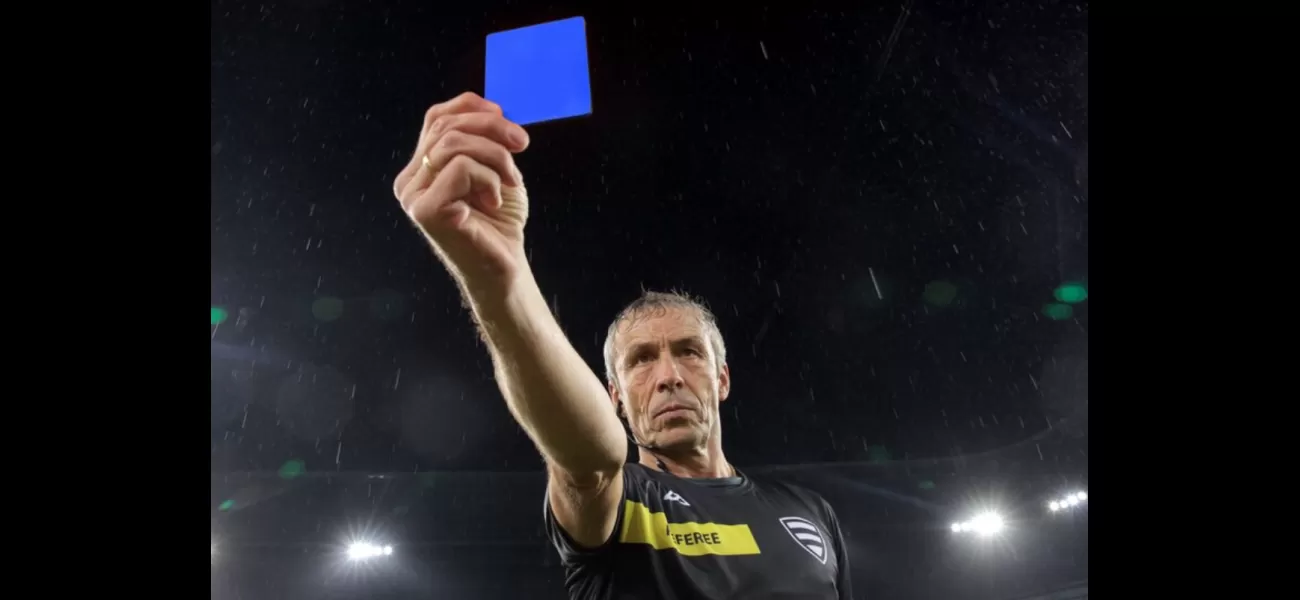FIFA sets the record straight about the introduction of blue cards and sin bins, providing all the necessary information.
Limiting trials to small competitions.
February 8th 2024.

Are you excited about the possible introduction of blue cards in football? It has been reported that the International Football Association Board (IFAB) is considering adding this new card to the sport, but FIFA has responded by criticizing the premature and inaccurate reports surrounding its immediate use in elite competitions. The IFAB is expected to make an official announcement on Friday after approving trials for the blue card during their meeting on Thursday. This would be the first time a new card has been introduced in football since the iconic yellow and red cards were implemented at the 1970 World Cup.
However, the plans have faced backlash and FIFA has clarified their intentions, downplaying the likelihood of seeing the blue card used in elite football anytime soon. In a statement, FIFA stated that any trials should be limited to lower levels and that they will reiterate this stance at the IFAB AGM on March 2nd.
If successful, the blue card and sin bin system could eventually make its way to the Premier League. But what exactly do these new cards mean and how will they be used? Let's take a closer look.
Similar to rugby, players who receive a blue card will be temporarily removed from the pitch for 10 minutes. This will be given to players who show dissent towards a match official or commit a cynical foul that prevents a promising attack, like Giorgio Chiellini's infamous shirt-pull on Bukayo Saka during the Euro 2020 final. If a player receives two blue cards or a combination of blue and yellow, they will be shown a red card and sent off for the rest of the game.
As of now, the blue card system will not be used in the Premier League. While the IFAB had initially agreed to trial it in elite competitions like the Premier League, it was decided that it would first be tested at lower levels. If proven successful, it could potentially be implemented in top-tier competitions in the future.
Currently, sin bins have already been used at grassroots and youth level with positive results, as it has helped reduce dissent on the field. The Football Association (FA) is considering using the FA Cup and Women's FA Cup next season for testing purposes, although this may not happen now due to FIFA's statement. The Football Association of Wales had also planned to trial the blue card this season, but they were unable to do so and instead showed yellow cards to players who were meant to be sent to the sin bin.
However, it's safe to say that the blue card system will not be used in the upcoming Euros or next season's Champions League. UEFA president Aleksander Ceferin has spoken out against its use, stating that it goes against the spirit of the game. But if the trials prove successful, he may have to reconsider his stance.
You may be wondering, why are they called blue cards? It's a simple explanation - while orange would have been the logical choice, blue was chosen to clearly differentiate the sin bin cards from the traditional yellow and red cards.
In conclusion, the possible introduction of blue cards in football has caused quite a stir. While it may not be used in elite competitions anytime soon, it's an interesting development that could potentially have a positive impact on the sport. Only time will tell if the trials are successful and if we will see the blue card become a permanent addition to the laws of the game.
However, the plans have faced backlash and FIFA has clarified their intentions, downplaying the likelihood of seeing the blue card used in elite football anytime soon. In a statement, FIFA stated that any trials should be limited to lower levels and that they will reiterate this stance at the IFAB AGM on March 2nd.
If successful, the blue card and sin bin system could eventually make its way to the Premier League. But what exactly do these new cards mean and how will they be used? Let's take a closer look.
Similar to rugby, players who receive a blue card will be temporarily removed from the pitch for 10 minutes. This will be given to players who show dissent towards a match official or commit a cynical foul that prevents a promising attack, like Giorgio Chiellini's infamous shirt-pull on Bukayo Saka during the Euro 2020 final. If a player receives two blue cards or a combination of blue and yellow, they will be shown a red card and sent off for the rest of the game.
As of now, the blue card system will not be used in the Premier League. While the IFAB had initially agreed to trial it in elite competitions like the Premier League, it was decided that it would first be tested at lower levels. If proven successful, it could potentially be implemented in top-tier competitions in the future.
Currently, sin bins have already been used at grassroots and youth level with positive results, as it has helped reduce dissent on the field. The Football Association (FA) is considering using the FA Cup and Women's FA Cup next season for testing purposes, although this may not happen now due to FIFA's statement. The Football Association of Wales had also planned to trial the blue card this season, but they were unable to do so and instead showed yellow cards to players who were meant to be sent to the sin bin.
However, it's safe to say that the blue card system will not be used in the upcoming Euros or next season's Champions League. UEFA president Aleksander Ceferin has spoken out against its use, stating that it goes against the spirit of the game. But if the trials prove successful, he may have to reconsider his stance.
You may be wondering, why are they called blue cards? It's a simple explanation - while orange would have been the logical choice, blue was chosen to clearly differentiate the sin bin cards from the traditional yellow and red cards.
In conclusion, the possible introduction of blue cards in football has caused quite a stir. While it may not be used in elite competitions anytime soon, it's an interesting development that could potentially have a positive impact on the sport. Only time will tell if the trials are successful and if we will see the blue card become a permanent addition to the laws of the game.
[This article has been trending online recently and has been generated with AI. Your feed is customized.]
[Generative AI is experimental.]
0
0
Submit Comment





